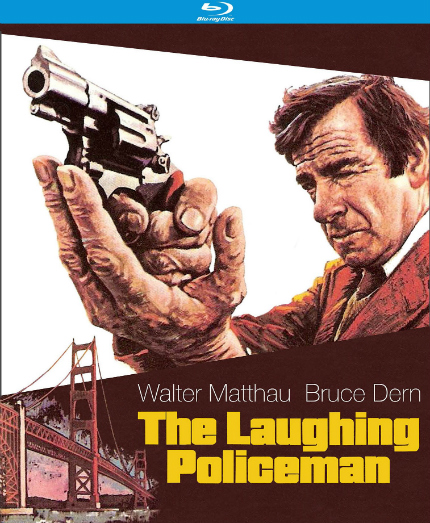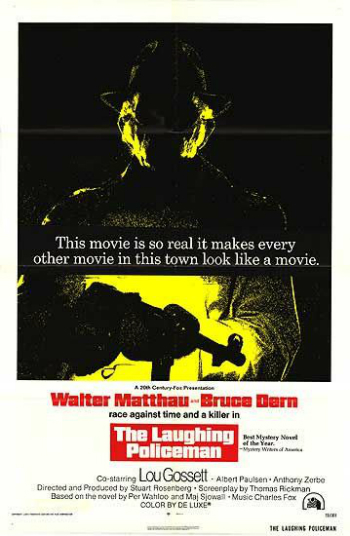70s Rewind: THE LAUGHING POLICEMAN, The Quiet, Convincing Thinker

God bless Walter Matthau.
In late 1972, when I began taking a closer interest in movies, Walter Matthau was the first "star" who appealed to me. Maybe it was as simple as his vague resemblance to my father, a lanky fellow born a year later and an inch or two shorter. Maybe it was how he walked with an uneven gait, or how he glared at stupid people doing stupid things, or how his smiles lit up the space around him.
He was one of the rare actors who could convincingly think on screen, which is much in evidence in The Laughing Policeman, a police drama in which jokes are in short supply. Come to think of it, the title doesn't really make any sense in the context of this loose American adaptation of a Swedish-language novel by Maj Sjöwall and Per Wahlöö. (I took to Wikipedia to discover that the title was based on a 1922 song with that title, given to a police detective as a gift by his daughter. He doesn't think it's funny, though.)
The major incidents remain the same as in the book. One night, a mysterious gunman murders a busload of people in San Francisco. Sgt. Jake Martin (Matthau) arrives on the bloody scene and discovers that his partner Dave Evans is among the victims.
It turns out that Evans was investigating a case in his spare time, hiding it from his girlfriend (Cathy Lee Crosby) and everyone else, including Sgt. Martin. That same night, Leo Larsen (Bruce Dern) is assigned as his partner and the two investigate the massacre, though their methods are as different as their personalities.
Leo is loud, boisterous, annoying and ambitious. He's also a racist, as manifested in several encounters with African-Americans. Jake, on the other hand, is a thinker, which is part of what makes him so effective as a detective. He never takes anything at face value and never gives up.
That has served to isolate him from his family, as illustrated in an uncomfortable sequence with his family after he arrives home, the morning after the massacre. He doesn't really know how to communicate with his teenage children, and his marriage is clearly strained.
Unable to solve his family issues, Jake devotes most of his time and energy into something he can (maybe) solve: the mass murder and its possible connection to an old, unsolved case for which he feels tremendous guilt.
 Matthau won an Academy Award for his performance opposite Jack Lemmon in Billy Wilder's The Fortune Cookie (1966), which launched him into starring roles at the age of 47. By the time The Laughing Policeman came along in 1973, he had a string of leading-man roles under his belt, as well as another Academy Award nomination for Kotch (1971).
Matthau won an Academy Award for his performance opposite Jack Lemmon in Billy Wilder's The Fortune Cookie (1966), which launched him into starring roles at the age of 47. By the time The Laughing Policeman came along in 1973, he had a string of leading-man roles under his belt, as well as another Academy Award nomination for Kotch (1971).
So he was ideally situated in his career to know what not to do as an actor. He had an ability to underplay his characters, making them feel like extensions of his personality, and his talent is what holds The Laughing Policeman together.
Journeyman director Stuart Rosenberg allowed his actors to do what they did best, as he did with other efforts such as Cool Hand Luke and the following year's The Drowning Pool, creating a relaxed atmosphere that occasionally bursts unexpectedly into action. Police procedurals have pretty much run their course in movies nowadays, yet it's still a pleasure to watch the the plot twists and character developments emerge without any particular rush.
Released three months after Matthau's starring role in Don Siegel's terrific Charley Varrick, the film faced tough competition at the box office, not only by the likes of the wildly popular The Godfather and The Sting, but also by the more action-oriented Magnum Force with Clint Eastwood.
Though the film faded from popular memory, it stuck with me because of Matthau, the title, and the trailer. Kino Lorber recently released a Blu-ray edition, featuring a lovely-looking video presentation of the 35mm original, an audio commentary by three experts on the era, and an 8-minute interview with actor Paul Koslo, who plays a drug dealer and has fond memories of his scenes with Matthau and Dern.
The Laughing Policeman is a modest movie, made with care and attention to detail, and is very satisfying to 70s film buffs like myself. Sadly and scarily, the mass murders at its heart feel more relevant than ever.
70s Rewind allows the writer to expound upon his favorite film decade.







